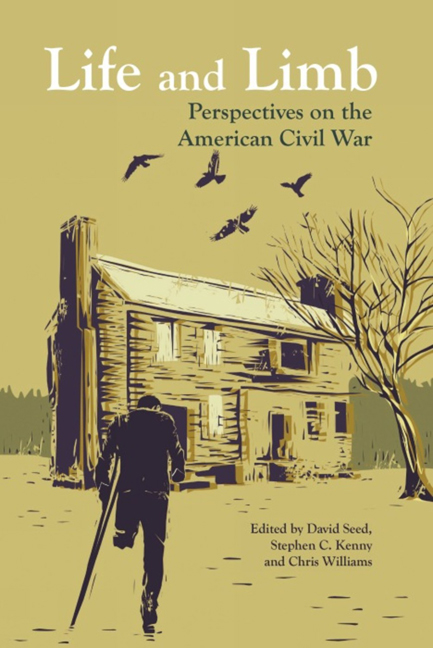Book contents
- Frontmatter
- Contents
- List of Illustrations
- Acknowledgements
- Introduction: Civil War Voices and Views
- MEDICAL AND SURGICAL MEMOIRS
- ACCOUNTS OF NURSING
- MEDICAL FACILITIES AND PATHOLOGY
- Jonathan Letterman on the Medical Corps: Medical Recollections of the Army of the Potomac
- The Confederate Military Prison Hospital at Andersonville, Georgia: Contributions Relating to the Causes and Prevention of Disease
- Field Hospitals: A Glimpse: Hardtack and Coffee
- Field Hospitals: The Need: A Manual of Military Surgery
- Plea for an Ambulance Service: A Brief Plea for an Ambulance System
- Hospital Broadside: North Carolina Hospital Broadside, 1863
- Hospitals in Richmond, Virginia: A Diary from Dixie
- Malingering: ‘Surgical Reminiscences of the Civil War’ and A Rebel's Recollections
- Roberts Bartholomew on Nostalgia: Contributions Relating to the Causes and Prevention of Disease
- Medical Welfare Begins: ‘Debut and Prospectus (The Crutch) and ‘Wounded’ (poem by ‘Sanatosia’)
- (Dis)embodied Identities: Civil War Soldiers, Surgeons, and the Medical Memories of Combat
- PHOTOGRAPHY
- AMPUTATIONS AND PROSTHETIC LIMBS
- IN THE FIELD OF BATTLE
- POST-WAR NARRATIVES
- Contributors
- Select Bibliography
- Index
- Plates
Plea for an Ambulance Service: A Brief Plea for an Ambulance System
from MEDICAL FACILITIES AND PATHOLOGY
- Frontmatter
- Contents
- List of Illustrations
- Acknowledgements
- Introduction: Civil War Voices and Views
- MEDICAL AND SURGICAL MEMOIRS
- ACCOUNTS OF NURSING
- MEDICAL FACILITIES AND PATHOLOGY
- Jonathan Letterman on the Medical Corps: Medical Recollections of the Army of the Potomac
- The Confederate Military Prison Hospital at Andersonville, Georgia: Contributions Relating to the Causes and Prevention of Disease
- Field Hospitals: A Glimpse: Hardtack and Coffee
- Field Hospitals: The Need: A Manual of Military Surgery
- Plea for an Ambulance Service: A Brief Plea for an Ambulance System
- Hospital Broadside: North Carolina Hospital Broadside, 1863
- Hospitals in Richmond, Virginia: A Diary from Dixie
- Malingering: ‘Surgical Reminiscences of the Civil War’ and A Rebel's Recollections
- Roberts Bartholomew on Nostalgia: Contributions Relating to the Causes and Prevention of Disease
- Medical Welfare Begins: ‘Debut and Prospectus (The Crutch) and ‘Wounded’ (poem by ‘Sanatosia’)
- (Dis)embodied Identities: Civil War Soldiers, Surgeons, and the Medical Memories of Combat
- PHOTOGRAPHY
- AMPUTATIONS AND PROSTHETIC LIMBS
- IN THE FIELD OF BATTLE
- POST-WAR NARRATIVES
- Contributors
- Select Bibliography
- Index
- Plates
Summary
Henry Ingersoll Bowditch (1808–1892) served as a Northern physician and published a pamphlet after his son Nathaniel died from wounds in battle: A Brief Plea for an Ambulance System for the Army of the United States, as drawn from the extra sufferings of the late Lieut. Bowditch and a wounded comrade (Boston: Ticknor and Fields, 1863). An ambulance corps was established in 1864.
I beg leave to state that Lieut. Bowditch, having been mortally wounded, in the first charge made after leaving Kelly's Ford, lay helpless on the ground, for some time, by the side of his dead horse. Two surgeons saw him, but they evidently had no means for carrying off the wounded officer, and it is believed no one connected with an Ambulance Corps ever approached him there.
A stranger horseman – probably from the Rhode Island forces – finally assisted him to get into a saddle; and he rode off, leaning over the neck of the animal – a terrible mode of proceeding, considering his severe wound in the abdomen. All this happened when he was in the rear of our victorious army, or, in other words, at just the place and time, at which a thorough Ambulance Corps should have been busily at work, seeking out, and relieving, with every means a great Government should have had at its disposal, the wretched and, perhaps, dying sufferers. But what, in reality, does the Government do to meet such an emergency? It provides a carriage, which a perfectly healthy man would find exceedingly uncomfortable to drive in, even for a few miles, and one driver, sometimes not the most humane. There are, also, I doubt not, various articles of surgical dressings, etc., for the wounded; but these articles are generally far in the rear of the army. The United States Government did not then, and never does, provide any men, whose duty it is to hasten to meet and to relieve these hours of poignant suffering. After Lieut. Bowditch arrived at the ambulance carriage, there was no water to be found in the casks, connected with it, although, bylaw, there should have been. The driver was wholly ignorant of the names of those whom he was carrying. He actually, and in answer to a direct question from Col. Curtis, denied that Lieut. Bowditch was one of them.
- Type
- Chapter
- Information
- Life and LimbPerspectives on the American Civil War, pp. 66 - 68Publisher: Liverpool University PressPrint publication year: 2015

